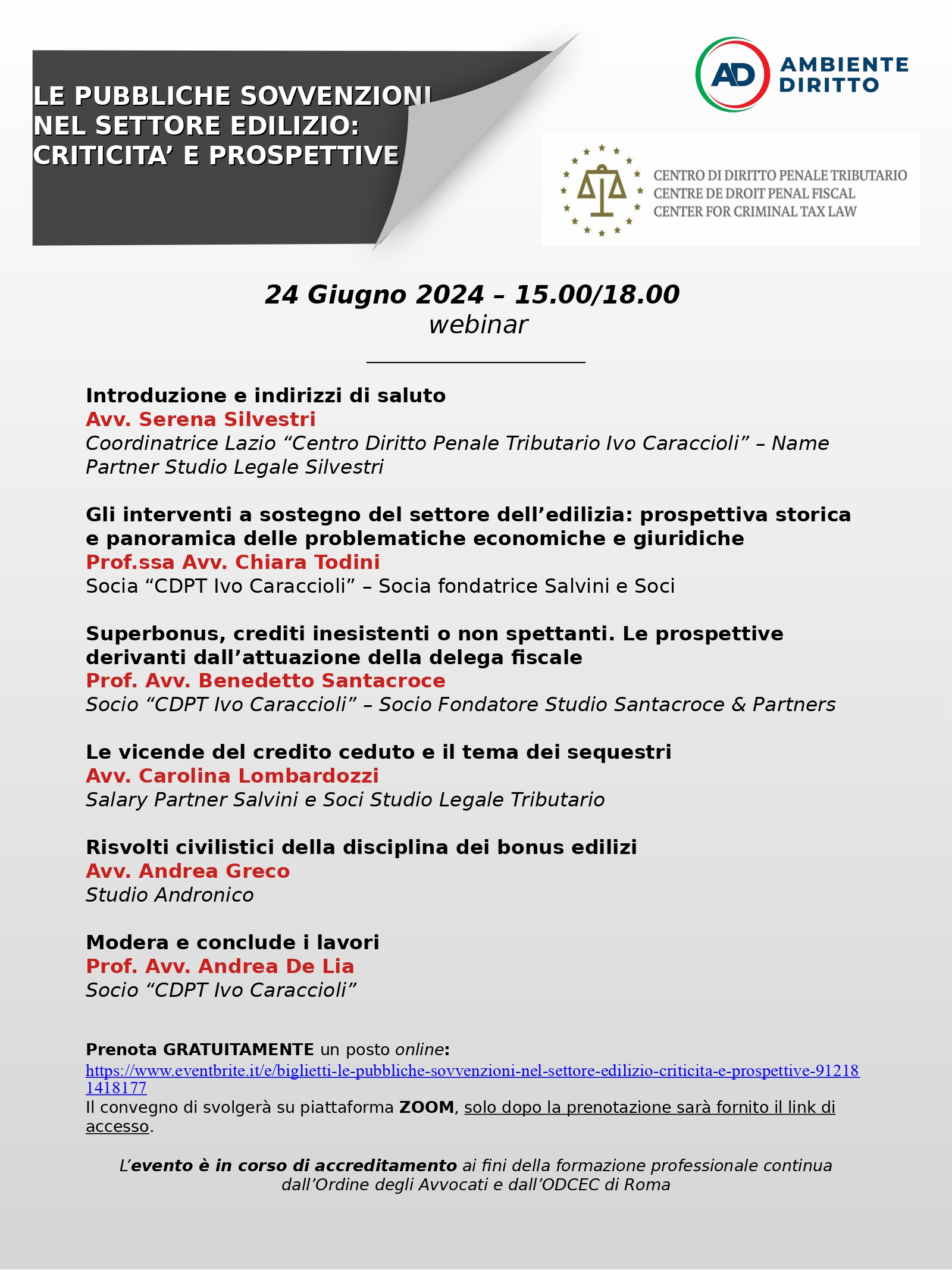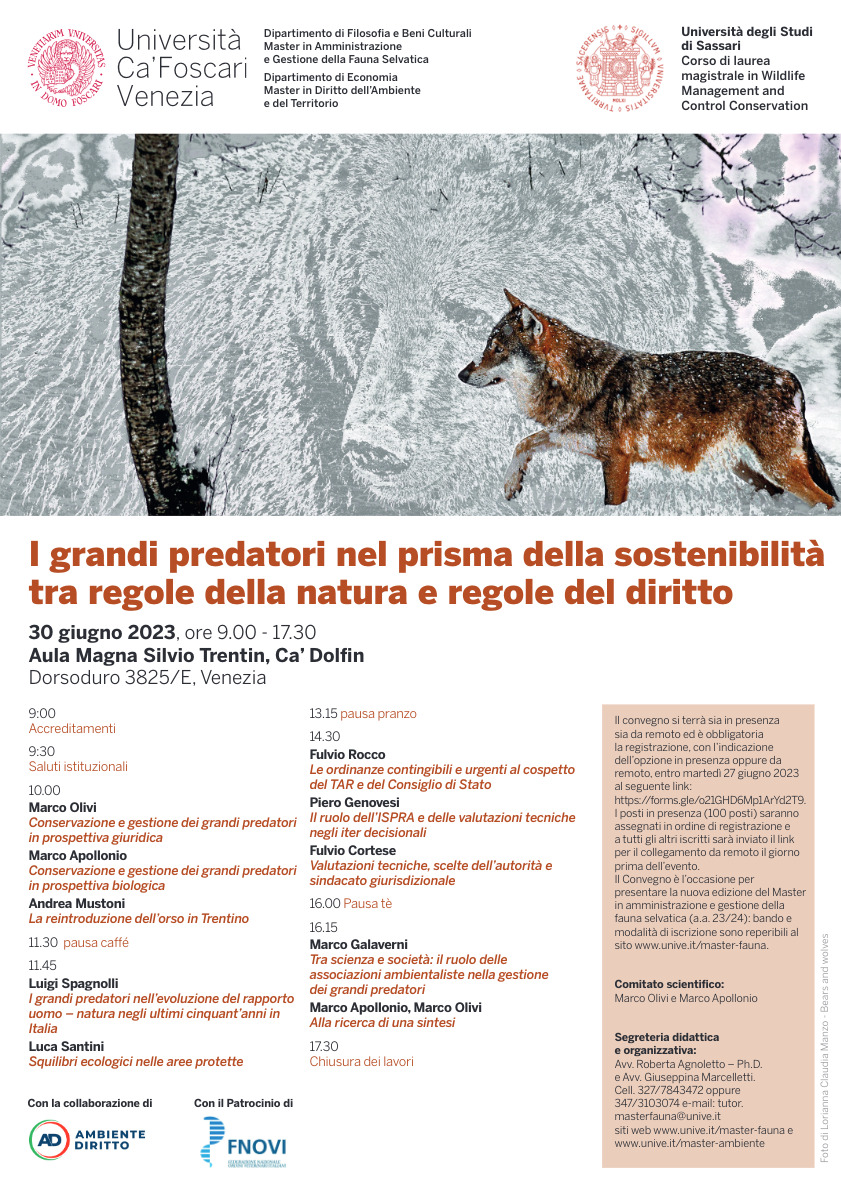______________ AMBIENTEDIRITTO ______________
THE PRECAUTIONARY PRINCIPLE IN THE WORK OF THE PUBLIC ADMINISTRATION: RISK MANAGEMENT IN CLIMATE CHANGE.
ENVIRONMENTAL SIMPLIFICATION IN DIGITAL TRANSITION.
THE WASTE CYCLE MANAGEMENT AND THE PROTECTION OF HEALTH AND ENVIRONMENT: THE ROLE OF THE PRECAUTIONARY PRINCIPLE.
VERA FANTI – MADDALENA IPPOLITO – ADRIANA CIAFARDONI
1. Report Vera Fanti: “The precautionary principle in the work of the public administration: risk management in climate change”.
Abstract: This report aims to highlight the fundamental role played by the precautionary principle in the issue of the climate emergency and how this principle is increasingly used in international governance policies to counter unpredictable phenomena, that could lead to environmental disasters, in connection with the evolution of the climate. The first part of the paper is dedicated to the analysis of the main historical and political stages in which the prediction of the precautionary principle has been related to the climate issue in order to face up to the problem of global warming. Then, the paper examines how this principle is currently employed by the most important acts, in particular the so-called European Green Deal. Finally, the essay reflects on the links between precautionary and proportionality principles, which are both of a relational nature, and necessary tools in the political decision-making processes for dealing with the global climate emergency.
Table Of Contents: 1. Introduction. Precaution and climate emergency – 2. Precaution and climate: brief historical explanation of the main international political decisions – 3. European Green Deal – 4. Precaution and proportionality. A conclusion.
2. Report Maddalena Ippolito: “Environmental simplification in digital transition”.
Abstract: The aim of the paper is to highlight, in the wake of the multiple European and national initiatives, the need for administrative simplification in environmental matters in order to pursue greater speed of proceedings relating to activities with environmental impacts and a “new” simplification of administrative authorizations. In this context the author proposes to underline the potential of Blockchain technology in order to reconfigure environmental protection according to a multipolar logic, preventing and reducing cases corruption or maladministration.
Table Of Contents: 1. Introduction – 2. Systematic framework and historical-evolutionary notes of environmental policies in the digital transition – 3. The “distributed” EIA procedure and the digital simplification of the Autorizzazione Integrata Ambientale (AIA) – 4. Some concluding remarks.
3. Report Adriana Ciafardoni: “The waste cycle management and the protection of health and environment: the role of the precautionary principle”.
Abstract: This paper aims to analyse the role that the precautionary principle can play in the waste management activity, which is considered an integral part of environment and ecosystem protection actions. After a careful analysis of the function of the principle in the various phases of the so-called waste cycle, with particular reference on the theme of classification of waste coded with mirror entries, the reflection focuses on the impact of the Covid-19 emergency. As the last, is treated the relationship between the precautionary principle and the circular economy.
Table Of Contents: 1. Introductory considerations. – 2. The application of the precautionary principle in the complex waste cycle management. – 3. The impact of the Covid-19 emergency – 4. Protection of health and the environment, between the precautionary principle and the circular economy. Brief concluding remarks.
***
Foggia University Study Visits (online) – May 7, 2021
CLIMAN Project
Erasmus Ka2 – Capacity Building
Report: V. Fanti – M. Ippolito – A. Ciafardoni
On May 7, 2021, an online Study Visits was held in Foggia, as part of the CLIMAN (Erasmus Ka2 – Capacity Building) project.
The project concerns the training of Climate Managers, through the study EU best practices, the selection and training of staff, and the updating of existing master’s degree programmes in “environmental protection and management”.
In this regard, it will be developed an interdisciplinary training module on the prevention, adaptation, and mitigation of climate change.
The aim of the project is to help universities in Georgia, Republic of Belarus and Ukraine become centres for the development of climate management research, in order to accelerate integration into the global climate market and to meet global climate regulation requirements, acquiring European best practices in the field of climate change prevention, adaptation and mitigation.
The specific objectives of the project are as follows:
1. Update existing master’s degree courses by developing an interdisciplinary “Climate Management” training module.
2. Establish climate management advisory centres at partner universities and ensure their sustainable development.
3. Facilitate development and strengthening of the institutional capacity of partner universities, with the aim of developing recommendations for the industrial, transport, energy, tourism and local authorities sectors in the field of climate change prevention, adaptation and mitigation.
The project organization includes the following bodies:
Project Coordinator: Netherlands Business Academy, the Netherlands.
Project Co-Coordinator: «KROK» University, Ukraine
Partners: Foggia University, Italy; University of Applied Sciences, Germany; Mykolas Romeris University, Lithuania; Turiba University, Latvia; Kharkiv National Automobile and Highway University, Ukraine; Lviv Polytechnic National University, Ukraine; Akaki Tsereteli State University Kutaisi, Georgia; Batumi Shota Rustaveli State University, Georgia; Polessky State University, Belarus; Yanka Kupala State University of Grodno, Belarus; Hultgren Nachhaltigkeitsberatung UG, Germany.
Within the project, the University of Foggia participated with some professors, such as, among the others, Professor Vera Fanti who presented her report in English to all related teachers.
The topic chosen by Prof. Fanti was the precautionary principle as a tool for the prevention of environmental risks arising from climate change. The report is attached together with two additional reports (also in English) presented during the training day. These two are annexed here and are written by two collaborators of the chair of administrative law of the University of Foggia, Dr. Maddalena Ippolito and Dr. Adriana Ciafardoni.
Scarica allegato





 AMBIENTEDIRITTO.IT EDITORE
AMBIENTEDIRITTO.IT EDITORE